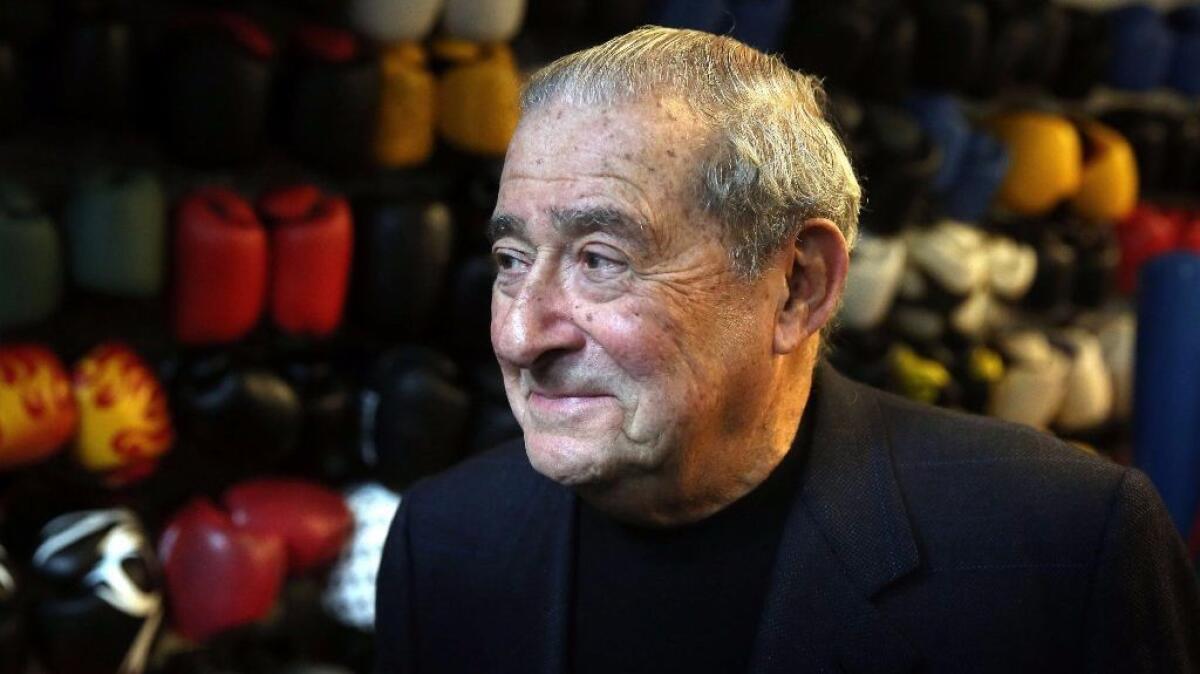Promoter Bob Arum reflects on his 50 years of experience in the boxing world

Boxing promoter Bob Arum attends a news conference in Hong Kong for his fighter Rex Tso on Jan. 27, 2016.
- Share via
Reporting from LAS VEGAS — Twenty minutes before his 2,000th boxing card began Saturday night, veteran promoter Bob Arum was in his seat, anticipating his next big fight and reflecting on the 50 years of experiences that preceded the event.
“I look back on pictures and see a young man, and I can’t believe it when I say that was me,” Arum said. “It’s been a lot of blood and sweat … and most of it was left by those guys in the ring.”
Arum, 85, opened his career with what he said may rank as the most perilous promotion of his career -- Muhammad Ali’s 1966 unanimous-decision victory over Canadian George Chuvalo in Toronto when Ali’s objection to the Vietnam War made finding an agreeable host problematic.
“It fell apart about 10 times and we got it set when we won [approval] in the Ontario Parliament by one vote,” Arum recalled.
Saturday’s main event was made with far less drama.
Arum’s gifted fighter, Ukrainian World Boxing Organization super-featherweight champion Vasyl Lomachenko (6-1), was given an HBO date and the license fee allowed Arum to revisit a bout that crumbled previously over finances against unbeaten former world featherweight champion Nicholas Walters of Jamaica.
Lomachenko, a two-time Olympic boxing champion, aspires to become boxing’s top pound-for-pound fighter, and Arum is plotting to get him there, pointing toward a possible 2017 passing-of-the-torch date against Manny Pacquiao.
Pacquiao created with Arum’s guidance the richest one-day sporting event in history in 2015 when he lost to Floyd Mayweather Jr., who spent his first decade with Arum’s Top Rank promotional company.
Veteran fight manager/agent Don Majeski said the top reason for Arum’s durability is his “tremendous sense of resiliency,” trusting his respected staff that includes executives Carl Moretti and Brad Jacobs, leaning on matchmakers Bruce Trampler and Brad Goodman to spot and retain talent such as Lomachenko, with publicists Fred Sternburg and Lee Samuels publicizing the fighters internationally.
“He loses a great star, he creates another one. He’s had [Marvin] Hagler and [Thomas] Hearns and [Sugar Ray] Leonard and [Oscar] De La Hoya. He’s never let a setback eliminate him from the business,” Majeski said.
Starting with Ali, the greatest boxing promoter of all, was an ideal early education.
Arum has the quick wit, too, like when he brought in famed handicapper Jimmy “The Greek” Snyder to place odds on the propositions of “Live” or “Die” on Evel Knievel’s ill-fated jump over the Snake River.
“Bob has a magnificent, creative mind. [Former rival promoter Don] King used to say he’d tell lies and make them come true. Bob sees a vision and makes it happen, an event that can transcend a boxing match,” Majeski said.
“Bob’s sort of lapped King … he’s a former U.S. Attorney, went to Harvard. It doesn’t mean you don’t have the hustle and huckster in you, but by and large, Bob always keeps his word. You can’t be crooked and dishonest for 50 years and stay in business. He’s 85 and still going strong. He says bombastic, incredible things and people say, ‘Bob’s over the top.’ That’s part of the genius. The good old days inform his decisions. But he’s always looking forward.”
The list of epic fights on Arum’s watch, from the Ali-Joe Frazier “Thrilla in Manila,” to Leonard-Hagler and Diego Corrales-Jose Luis Castillo, are too bountiful to recall here.
Arum says he ranks his favorites not by the dollars generated but by the rise of interest created by the promotion.
“When I look back, the one I’m most proud of, because I thought it up myself, was Leonard – the gold-medalist who had a clear path to a title – against Hagler, the club fighter who was not recognized because nobody wanted to fight. So I called it the ‘Yuppie’ agaistn the ‘Blue-Collar,’ and it caught on,” Arum said.
“You can be a schemer or a blow-hard in this business and it works for awhile, but my strength was finding a story line for a fight and selling it.”
Follow Lance Pugmire on Twitter @latimespugmire
More to Read
Go beyond the scoreboard
Get the latest on L.A.'s teams in the daily Sports Report newsletter.
You may occasionally receive promotional content from the Los Angeles Times.











